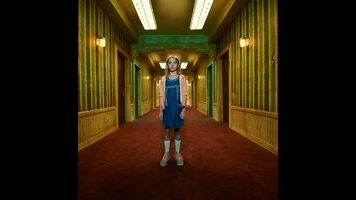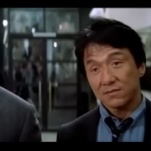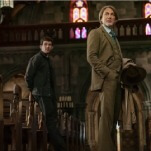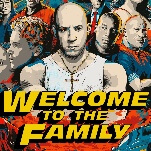When an episode opens with The Night Stalker strutting into the Hotel Cortez and announcing “I have a standing reservation” to the star-struck Liz Taylor, it’s clear American Horror Story is swinging for the fences, and “Devil’s Night” is a bang-up episode of whatever it is that American Horror Story: Hotel aspires to be. There are some colorful, carefully calibrated performances, some laugh-out loud funny lines, some appallingly nasty moments, and some gaudy surprises. But ultimately, it’s empty.
Halloween is a big deal in the American Horror Story universe, a night when spirits are unbound from their haunts and free to work their will in the world. James Patrick March disdains the frippery and frolic of Halloween, the costumes and candy. Instead, he hosts his annual Devil’s Night dinner, inviting a select list of dead serial killers. On the guest list this year are Richard Ramirez (Anthony Ruivivar), Aileen Wournos (Lily Rabe), John Wayne Gacy (John Carroll Lynch), Jeffrey Dahmer (Seth Gabel), The Zodiac Killer (in a black hood, because his identity was never confirmed and presumably because John Carroll Lynch was already cast as Gacy)… and Det. John Lowe.
It’s a showcase for the actors, who put on the well-documented, if reductive mannerisms of their characters with lusty appetite. Ramirez is all cool swagger, the rock star of the Cortez’s Devil’s Nights three years running, ever since his death in 2013. John Wayne Gacy is smug, fussy, and pathetically self-aggrandizing, congratulating himself that “just because you got 30 bodies buried in your crawlspace don’t mean you can’t have a really terrific rec room and be a respectable businessman.”
Gabel’s Dahmer is halting and reticent, frankly dorky, until suddenly he waxes disturbingly poetic. When March presents “the amuse-bouche,” a young man stripped to the waist and blinking in confusion, Dahmer straddles the victim, sniffing his hair and rambling about his desire “to control them […], to make them my life, make them part of me.” Disgusted, he breaks off. “It never friggin’ works, though. They always die, like, ten minutes later.”
Rabe’s broad, loose gestures and bared teeth paint the image of Wournos’ well-known face over her own delicate features, but this performance is no caricature. “Look at me. Look at my eyes,” she demands of John, and if he’s even a halfway decent cop, he should see more than a Halloween costume there. (He isn’t; he looks straight at Miss Evers’ bathtub full of bloody water and walks right out again, never getting an explanation.) Rabe’s performance is alive with rough fury and barely submerged violence, but her eyes also blaze with a peculiar combination of defensiveness and vulnerability.
They’re the greatest killers of their time, March announces. And March was their mentor. “He is the master,” Ramirez tells John Lowe. “He taught us all. He’s a genius, like Galileo or Peter Frampton.” There’s a lurid dedication to detail here. Ramirez’s lesson from the master—“if I wanted to be a volume operation, I needed to be indiscriminate, kill anyone, no pattern”—reflects the horrifying randomness that marked his crimes, and the sequence of The Night Stalker entering a room where guests sleep peacefully, rifling their things, then bashing at them with a lamp is scattered with details taken straight from case files. (March’s aside identifying them as tourists from Arizona cements these victims not as more of the hotel’s phantasms but as real living people introduced only to be tormented and bludgeoned. Gratuitous, contentless, and brutal. That’s AHS’s style.)
As the sole civilian guest at James March’s Devil’s Night soirée, Lowe has to break free of the restraints of courtesy as well as the more literal restraints of Gacy’s infamous handcuffs in a futile attempt to save their victim. He shoots, and Dahmer turns to ask scornfully, “Don’t you get that we’re already dead?” As he resumes drilling into the young man’s skull, Aileen and The Night Stalker sway to “Sweet Jane.”
It’s a nasty set piece, well-executed, with good performances and the promising frisson that can arise when mismatched characters gather over a shared passion. And it’s meaningless. “Devil’s Night” is a holiday, a vacation from whatever the real business of the Hotel Cortez is, and from the story arcs of AHS: Hotel.
John can shoot them, or not. They’re already dead, and shooting won’t stop them from taking another victim, and another, and another. There’s no escape, no changing them, and no consequences for John either way. When Sally dismisses his story (still evident from the screams hanging in the air around them) as an absinthe dream, it’s just one more way American Horror Story wipes its slate clean, eliminating whatever half-hearted progress it’s made toward telling a story.
Some story does get unfolded, but it’s so detached from the main action of “Devil’s Night” that it almost feels like a separate episode, and a boring one. Alex Lowe brings Holden home; neither his cold flesh (75.5 degrees Fahrenheit) nor his failure to age since 2010 clue in the doctor to how truly weird her son’s state is, and she only returns him to the Cortez when she finds him feeding on the family dog. (Detective and Dr. Lowe owe Scarlett an apology for dismissing her report of the weird room and weird kids she found there.)
The Countess greets Alex, “You must have a lot of questions. I have answers.” She delivers another chunk of explanation… except this, too, is repetition, describing once again the force that sustains her as “an ancient virus, a blood disorder” that bestows “health, vitality, and everlasting life.” It all sounds portentous, but like that glass coffin waiting for Holden in the unused pool, it’s just a fancy box—well-crafted, transparent, and holding nothing.
There’s a lot of eternity in “Devil’s Night” but not much significance to it. March toasts his guests for their notoriety—“Like The Iliad, your stories will live on forever”—and pledges that their shared murder “bonds us together for eternity.” The Countess promises Alex eternal life with her son, and in return she demands “undying loyalty.”
But Sally seems to know the score. There’s no timelessness in her, no eternity, no grand design. Sally’s sacrifice, the visiting businessman she lures to the hotel, is not to secure eternity, but to buy “another year of being left alone.” Sally’s goals are as prosaic as the show is, under its grandeur.
Stray observations
- I nearly described John Lowe as the sole living guest at March’s Devil’s Night table, but do we know that he’s alive? Do we care?
- Richard Ramirez scoffs at Liz Taylor, “I don’t need a key.” I’m a little ashamed how hard I laughed at that.
- Jeffrey Dahmer’s desire “to control” his victims echoes John’s remark to Liz Taylor: “My soon-to-be ex-wife says I was never an alcoholic. According to her, I’m just a control freak.” That parallel would have more weight if John weren’t repeating Alex’s words from the previous episode almost verbatim. The last thing this show needs is padding out with repetition.
- Poor Miss Evers, whose son was taken on Halloween and who’s left with only an eternity of blood-soaked sheets, and poor Mare Winningham, whose artful, weird performance feels completely disconnected from the bulk of the episode despite its thematic connection. How did Hazel Evers go from a mother heartbroken by a serial killer to a woman enthralled by one?








































